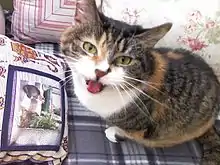Meow
A meow is a vocalization of cats. They might have diverse tones and are sometimes chattered, murmured or whispered. Adult cats rarely meow to each other, so an adult cat meowing to human beings is probably a post-domestication extension of meowing by kittens; a call for attention.[1]

The meow can be assertive, plaintive, friendly, bold, welcoming, attention-soliciting, demanding, or complaining. It can even be silent, where the cat opens its mouth but does not vocalize.[2] Just as humans may verbalize exhaustively when they are happy, so can cats. According to The Purrington Post, a chatty cat is likely happy too.[3]
A mew is a high-pitched meow often produced by domestic kittens.[4] It is apparently used to solicit attention from the kitten's mother,[5] and adult cats may use it as well.[4] The mew is similar to what is described in Brown et al. 1978 as an isolation call. By around three to four weeks of age kittens do not mew when at least one littermate is present, and at four to five months of age kittens stop mewing altogether.[6]
Spelling
In American English, the spelling "meow" was first used in 1842. Before that, the word could be spelled "miaow", "miau", or "meaw". Of any variant, the earliest attestation of a cat's cry in Early Modern English is from the 1630s.[7] The sound itself is spelled "rowr".
Language differences
The following table lists the onomatopoeic word for the "miau" or "meow" sound in various languages. In some languages (such as Chinese 喵, miāo, and Thai แมว, mæw), the vocalization became the name of the animal itself.
| Written form | Languages in use |
|---|---|
| muwaa' (مُواء) | Arabic[8] |
| meo | Vietnamese[9] |
| meong | Indonesian[10] |
| miyu (میو) | Persian |
| rowr | American English[11] |
| mèu | Catalan |
| miaou | French |
| miau | Belarusian, Croatian, Finnish, German, Ido, Interlingua, Latin, Lithuanian, Polish, Portuguese, Romanian, Spanish |
| miauw | Dutch |
| miao (喵) | Mandarin Chinese |
| ngiao1 / ngiou1 (喵) | Teochew dialect[12] |
| miu1 (喵) | Cantonese |
| miao | Italian |
| miaow | British English[13] |
| miyav | Turkish |
| miav | Danish |
| mjau | Norwegian and Swedish |
| miyau (միյաւ) | Armenian |
| mao (ম্যাঁও (myām̥ō)) | Bengali |
| meogre | Kyrgyz |
| miaŭ | Esperanto |
| ngiyaw | Filipino[14] |
| miyāʾūṉ (میاؤں) | Urdu[15] |
| mjá | Icelandic |
| mňau | Slovak, Czech |
| ngeung | Kapampangan[16] |
| knavili (კნავილი) | Georgian |
| njäu | Estonian |
| ņau | Latvian |
| nyav | Ukrainian |
| mi'au | Lojban |
| niaou (νιάου) | Greek[17] |
| nyā (にゃー) | Japanese |
| yaong (야옹) or nyang (냥) | Korean |
| myau (מיאו) | Hebrew |
| myau (מיאַו) | Yiddish |
| mjau (мјау) | Serbian |
| miáú (miau) or nyaú | Hungarian |
| myau (мяу) | Russian, Bulgarian |
| ngiau | Malay[18] |
| mijav | Slovene |
| mia'wj | Mi'kmaw |
See also
- Cat communication
- Cross-linguistic onomatopoeias
- Devocalization
- Jingle Cats
- Meow the Jewels, a hip-hop album by Run the Jewels with all instrumentals replaced with meowing
- Meow Mix, cat food
- Miao (disambiguation)
References
| Look up meow in Wiktionary, the free dictionary. |
| Wikimedia Commons has media related to Cats meowing. |
- "Meowing and Yowling". Virtual Pet Behaviorist. ASPCA. Retrieved 28 May 2012.
- Bradshaw, John W. S. (January 2016). "Sociality in cats: A comparative review". Journal of Veterinary Behavior: Clinical Applications and Research. 11: 113–124. doi:10.1016/j.jveb.2015.09.004. ISSN 1558-7878.
- Romper, June 1, 2018 - Do Cats Smile? Here's How To Tell Your Cat Is Happy, At Least On The Inside By Shari Maurer
- Schötz, Susanne; van de Weijer, Joost; Eklund, Robert (2017-08-25). Phonetic Characteristics of Domestic Cat Vocalisations (PDF). 1st Intl. Workshop on Vocal interactivity in-and-between Humans, Animals and Robots (PDF). pp. 5–6. ISBN 978-2-9562029-0-5.
- Miller, P. (2000). "Whisker whispers". Association of Animal Behavior Professionals. Archived from the original on November 5, 2013. Retrieved November 5, 2013.
- Brown, K.A., Buchwald, J.S., Johnson, J.R. and Mikolich, D.J. (1978). "Vocalization in the cat and kitten". Developmental Psychobiology. 11 (6): 559–570. doi:10.1002/dev.420110605. PMID 720761.CS1 maint: multiple names: authors list (link)
- "Meow". Online Etymology Dictionary. Retrieved 27 December 2015.
- الدغامين, أحمد (March 6, 2008). "السموع : أسماء أصوات الحيوانات والطيور بالعربية ( الجزء الأول )". Abu Dhabi. Retrieved 12 April 2018.
- Peggy Bivens (2002). Language Arts 1, Volume 1. Saddleback Publishing. p. 59. ISBN 978-1562-54508-6.
- Meong at KBBI Daring
- "animal onomatopoeia". www.writtensound.com. Retrieved 2021-01-24.
- 喵, Teochew dialect
- "MIAOW | meaning in the Cambridge English Dictionary". dictionary.cambridge.org. Retrieved 2020-02-07.
- "Filipino Animal Sounds: Tagalog to English: Dictionary Online". tagaloglang.com. 1 September 2018. Retrieved November 15, 2018.
- فیروز الدین, مولوی (1978). فیروز اللغات اردو جامع (in Urdu) (2nd ed.). Lahore: Feroz Sons, Ltd. p. 1334. ISBN 9690005146.CS1 maint: extra punctuation (link) CS1 maint: multiple names: authors list (link)
- ""Ngeung, "a cat's meow;" ngumeung, "to meow;" ngeungan, "against whom the cat meows, like at one who is eating."" (PDF). hau.edu.ph. p. 96. Retrieved 14 November 2017.
- νιαουρίζω. WordReference.com (in Greek). Retrieved 28 May 2012.
- Ngiau at Pusat Rujukan Persuratan Melayu